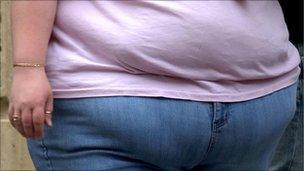Diabetes rate 'doubles' - Imperial College and Harvard research suggests
- Published

Obesity is a major risk factor for Type 2 diabetes
The number of adults with diabetes in the world has more than doubled since 1980, a study in the Lancet says.
Researchers from Imperial College London and Harvard University in the US analysed data from 2.7m people across the world, using statistical techniques to project a worldwide figure.
The total number of people with all forms of the disease - which can be fatal - has risen from 153m to 347m.
The authors called for better detection and treatment to combat the rise.
Its authors said 70% of the rise was down to people living longer.
The rise has been most pronounced in the Pacific Islands. In the Marshall Islands a third of all women have the condition.
Majid Ezzati, of Imperial College London, said: "Diabetes is becoming more common almost everywhere in the world.
"Unless we develop better programmes for detecting people with elevated blood sugar and helping them to control their weight, diabetes will continue to impose a major burden on health systems around the world."
Diabetes leads to inadequate blood sugar control, which can damage the kidneys and cause blindness. It can also cause heart disease and strokes.
The study looked at Type 1 and Type 2 diabetes. Researchers believe most cases were Type 2, which is closely linked with lifestyle and obesity.
Of developed nations, the US had the highest prevalence. The diabetes rate was relatively low in western Europe.
Drug market booming
The study, carried out in conjunction with the World Health Organization, found that the diabetes rate had either risen or stayed the same in virtually every country.
Spending on diabetes medicines - already worth £22bn annually - could hit £30bn by 2015, according to drug research firm IMS Health.
Dennis Urbaniak, of pharmaceutical firm Sanofi, said: "This is a chronic, progressive condition.
"What we are most worried about is the number of people out there with diabetes that is not optimally controlled."
Dr Iain Frame, director of research at charity Diabetes UK, said: "Although this study shows the prevalence of diabetes in the UK is lower than most other developed countries, we should be cautious about how the information was collected and analysed.
"Nevertheless, we should not be complacent about our country's health since it is clear that rates of obesity and Type 2 diabetes are still rising at an alarming rate.
"There are 850,000 people in the UK who have Type 2 diabetes but don't know it, which may help to account for the lower numbers estimated."
The risk factors for Type 2 diabetes are being overweight, of South Asian or Black origin, aged over 40 or having a family history of the condition.
If you have at least two risk factors it is recommended that you ask your doctor for a blood test.
- Published24 June 2011
- Published24 June 2011